英语听力课作业 1
义务教育课程标准英语作业本四年级上册听力材料
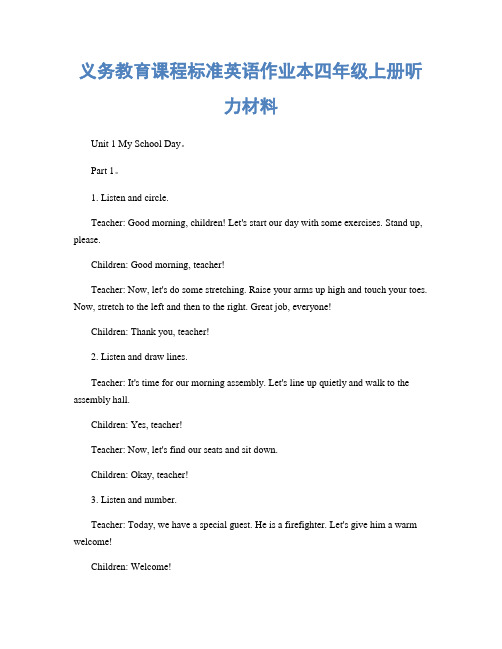
义务教育课程标准英语作业本四年级上册听力材料Unit 1 My School Day。
Part 1。
1. Listen and circle.Teacher: Good morning, children! Let's start our day with some exercises. Stand up, please.Children: Good morning, teacher!Teacher: Now, let's do some stretching. Raise your arms up high and touch your toes. Now, stretch to the left and then to the right. Great job, everyone!Children: Thank you, teacher!2. Listen and draw lines.Teacher: It's time for our morning assembly. Let's line up quietly and walk to the assembly hall.Children: Yes, teacher!Teacher: Now, let's find our seats and sit down.Children: Okay, teacher!3. Listen and number.Teacher: Today, we have a special guest. He is a firefighter. Let's give him a warm welcome!Children: Welcome!Firefighter: Thank you, children! I'm here to talk to you about fire safety. Remember, stop, drop, and roll if your clothes catch on fire.Children: We will remember, firefighter!Part 2。
《大学英语视听说课程实训手册第1册》听力原文-B1U1-U8
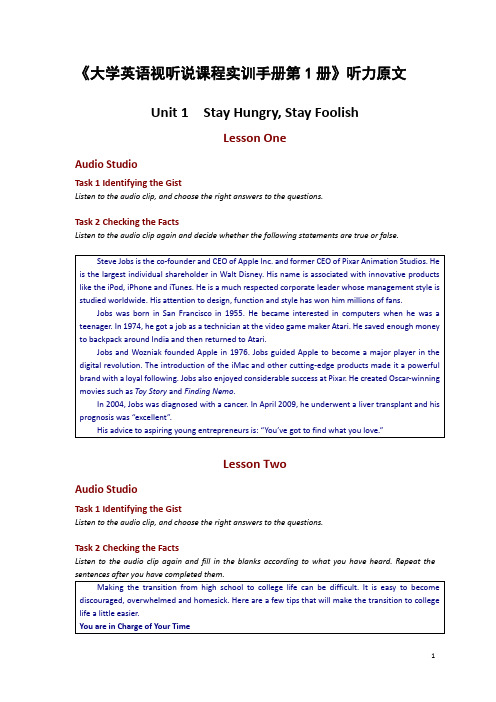
《大学英语视听说课程实训手册第1册》听力原文Unit 1 Stay Hungry, Stay FoolishLesson OneAudio StudioTask 1 Identifying the GistListen to the audio clip, and choose the right answers to the questions.Task 2 Checking the FactsListen to the audio clip again and decide whether the following statements are true or false.Lesson TwoAudio StudioTask 1 Identifying the GistListen to the audio clip, and choose the right answers to the questions.Task 2 Checking the FactsListen to the audio clip again and fill in the blanks according to what you have heard. Repeat theUnit 2 The Internet: A Double-Edged SwordLesson OneAudio StudioTask 1Identifying the GistListen to the audio clip, and choose the right answers to the questions.Task 2Checking the FactsListen to the audio clip again and decide whether the following statements are true or false.Lesson TwoAudio StudioTask 1 Identifying the GistListen to the audio clip, and choose the right answers to the questions.Task 2Checking the FactsListen to the audio clip again and fill in the blanks according to what you have heard. Repeat the sentences after you have completed them.Unit 3 Animation WorldLesson OneAudio StudioTask 1 Identifying the GistListen to the audio clip, and choose the right answers to the questions.Task 2 Checking the FactsListen to the audio clip again and decide whether the following statements are true or false.Lesson TwoAudio StudioTask 1 Identifying the GistListen to the audio clip, and choose the right answers to the questions.Task 2Checking the FactsListen to the audio clip again and fill in the blanks according to what you have heard. Repeat the sentences after you have completed them.Unit 4 Financial IntelligenceLesson OneAudio StudioTask 1Identifying the GistListen to the audio clip, and choose the right answers to the questions.Task 2Checking the FactsListen to the audio clip again and decide whether the following statements are true or false.Lesson TwoAudio StudioTask 1Identifying the GistListen to the audio clip, and choose the right answers to the questions.Task 2Checking the FactsListen to the audio clip again and fill in the blanks according to what you have heard. Repeat the sentences after you have completed them.Unit 5 Public TransportLesson OneAudio StudioTask 1Identifying the GistListen to the audio clip, and choose the right answers to the questions.Task 2Checking the FactsListen to the audio clip again and fill in the blanks according to what you have heard. Repeat the sentences after you have completed them.Lesson TwoAudio StudioTask 1Identifying the GistListen to the audio clip, and choose the right answers to the questionsTask 2Checking the FactsListen to the audio clip again and decide whether the following statements are true or false.Unit 6 Post-Olympic AgeLesson OneAudio StudioTask 1 Identifying the GistListen to the audio clip, and choose the right answers to the questions.Task 2 Checking the FactsListen to the clip again and decide if the following statements are true or false.Lesson TwoAudio StudioTask 1Identifying the GistListen to the audio clip, and choose the right answers to the questions.Task 2Checking the FactsListen to the audio clip again and fill in the blanks according to what you have heard. Repeat the sentences after you have completed them.Unit 7 Body LanguageLesson OneAudio StudioTask 1Identifying the GistListen to the audio clip, and choose the right answers to the questions.Task 2Checking the FactsListen to the audio clip again and fill in the blanks according to what you have heard. Repeat the sentences after you have completed them.Lesson TwoAudio StudioTask 1Identifying the GistListen to the audio clip, and choose the right answers to the questions.Task 2Checking the FactsListen to the audio clip again and decide whether the following statements are true or false.Unit 8 Beyond the BluesLesson OneAudio StudioTask 1Identifying the GistListen to the audio clip and choose the right answers to the questions.Task 2Checking the FactsListen to the audio clip again and decide whether the following statements are true or false.Lesson TwoAudio StudioTask 1Identifying the GistListen to the audio clip, and choose the right answers to the questions.Task 2Checking the FactsListen to the audio clip again and fill in the blanks according to what you have heard. Repeat the sentences after you have completed them.11。
英语初级听力原文(listen to this1)1课

Student 1: Not really. My parents are fairly(相当) well off(富裕的) so I get an allowance(津贴 补助) from my father.
Reporter: You're lucky, aren't you?
Student 1: I suppose so.
Reporter: What about you? Are your parents wealthy?
Student 2: No, certainly not.
Reporter: Do you work during the holidays?
Student 2: Well, last Christmas I did two weeks as temporary(临时的) postman, then in the summer I spent four weeks fruit picking, and I do a bit of baby-sitting, so I manage.
Full stop 句号
Comma 逗号
—I'm an accountant.(会计)
—Oh! Do you enjoy it?
—No. I don't really like it. It's boring.
3—Where do you come from?
—Indonesia.(印度尼西亚)
—Oh! Which part?
—Jakarta.(雅加达)
—Really?
4—Can you speak German?
—Yes, I can. I speak it very well.
六年级下册英语第一作业听力
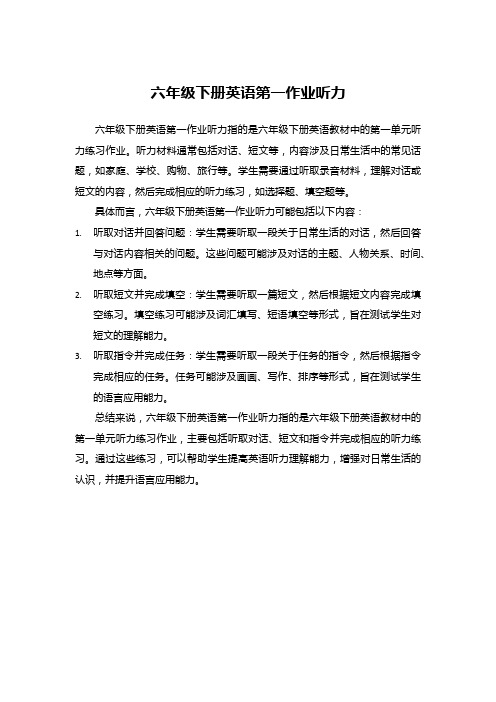
六年级下册英语第一作业听力
六年级下册英语第一作业听力指的是六年级下册英语教材中的第一单元听力练习作业。
听力材料通常包括对话、短文等,内容涉及日常生活中的常见话题,如家庭、学校、购物、旅行等。
学生需要通过听取录音材料,理解对话或短文的内容,然后完成相应的听力练习,如选择题、填空题等。
具体而言,六年级下册英语第一作业听力可能包括以下内容:
1.听取对话并回答问题:学生需要听取一段关于日常生活的对话,然后回答
与对话内容相关的问题。
这些问题可能涉及对话的主题、人物关系、时间、地点等方面。
2.听取短文并完成填空:学生需要听取一篇短文,然后根据短文内容完成填
空练习。
填空练习可能涉及词汇填写、短语填空等形式,旨在测试学生对短文的理解能力。
3.听取指令并完成任务:学生需要听取一段关于任务的指令,然后根据指令
完成相应的任务。
任务可能涉及画画、写作、排序等形式,旨在测试学生的语言应用能力。
总结来说,六年级下册英语第一作业听力指的是六年级下册英语教材中的第一单元听力练习作业,主要包括听取对话、短文和指令并完成相应的听力练习。
通过这些练习,可以帮助学生提高英语听力理解能力,增强对日常生活的认识,并提升语言应用能力。
英语听力1本-
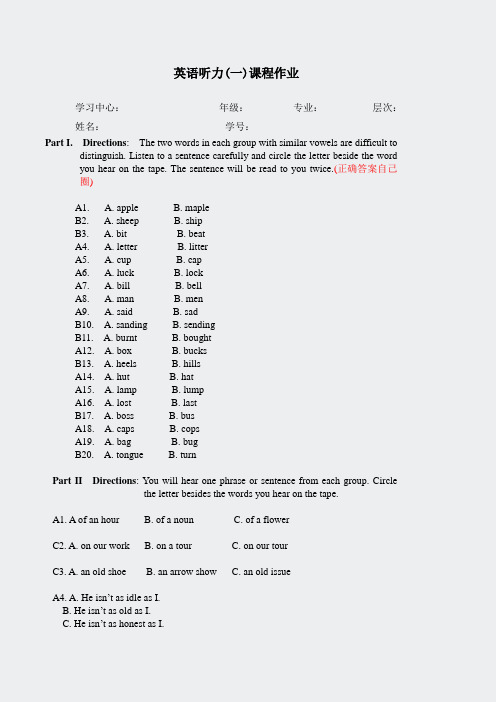
英语听力(一)课程作业学习中心:年级:专业:层次:姓名:学号:Part I.Directions: The two words in each group with similar vowels are difficult to distinguish. Listen to a sentence carefully and circle the letter beside the wordyou hear on the tape. The sentence will be read to you twice.(正确答案自己圈)A1. A. apple B. mapleB2. A. sheep B. shipB3. A. bit B. beatA4. A. letter B. litterA5. A. cup B. capA6. A. luck B. lockA7. A. bill B. bellA8. A. man B. menA9. A. said B. sadB10. A. sanding B. sendingB11. A. burnt B. boughtA12. A. box B. bucksB13. A. heels B. hillsA14. A. hut B. hatA15. A. lamp B. lumpA16. A. lost B. lastB17. A. boss B. busA18. A. caps B. copsA19. A. bag B. bugB20. A. tongue B. turnPart II Directions: You will hear one phrase or sentence from each group. Circlethe letter besides the words you hear on the tape.A1. A of an hour B. of a noun C. of a flowerC2. A. on our work B. on a tour C. on our tourC3. A. an old shoe B. an arrow show C. an old issueA4. A. He isn’t as idle as I.B. He isn’t as old as I.C. He isn’t as honest as I.B5. A. He went there at four o’clock.B. He went there to look for a cook.C. He went there to look for a cock.B6. A. where can I find a shop?B. Where can I find a bus stop?C. Where can I find a cloth?A7. A. We’ll return later on.B. We’ll return the ladder.C. We’ll return it to the lady.B8. A. It’s not all a game.B. It’s a notice of a game.C. It’s a note of a game.A9.. A. We composed an essay every week.B. We come home every week.C. We can post a letter every week.B10. A. Don’t accept his offer before we’ve talked.B. Don’t accept his offer because of his laughter.C. Don’t accept his offer because of his daughter.Part III. ( A)Directions: Listen to the following short conversations twice and choose the right answer to each question you hear on the tape.A1. A. $ 8.50 B. $ 12.00 C. $ 12.50 D. $ 8.ooB2. A. A lot of gifts. B. Some clothes.C. Some toys.D. Some flowers.A3. A. Exactly a week. B. More than two weeks.C. About a week.D. Four or five days.C4. A. He can correct his mistake later.B. He answered that question correctly.C. He can’t change his answer now.D. He didn’t answer that question on the test.D5. A. To get some thread.B. To get some buttons.C. To get a needle.D. To get a needle and some thread.(B)Directions: Listen to the passage twice and choose the right answer to each question you hear on the tape.A1. A. A **pany.B. The local church.C. The fire brigade.C2. A. Two days. B. A day and a night. C. Two days and nights.A3. A. Because the chiming of church bells could tell the hours.B. Because the chiming of church bells might awake people.C. Because the chiming of church bells would make people upset.B4. A. A church bell ringing.B. A whistle blast.C. The town clock chiming.A5. A. Worried and nervous. B. Hungry and thirsty. C. Eager to buy watches. Part IV.Directions:Listen to the following short conversation twice and fill in the blanks with the missing words.1.A: Will Mr. Black be _____able__ to see me at about 9 tomorrow?B: I’m afraid he won’t be __free______ until 3 in the afternoon.2.A: I’d like to ____fix____ an appointment with the Sale Director._____Would____ nine tomorrow be all right?B: Do you think you could ____make___ it 10:30?3.A: Do you think the manager could ___see_____ me tomorrow before 10?B: He won’t be ____in____ till 10:30.4.A: Why are you so ___tired_____?I’ve been waiting for ____more____ than half an hour!B: My bicycle had a flat tire and I had to ___walk_____.5.A: Good morning. I ___had_____ an appointment with Dr. Smith.B: Please have a ____seat____. He will be ____with____ you in a few minutes. Part V. Directions: Listen to the following longer conversation twice and decidewhether the following statements are true or false. Write “ T”for true or “F” for false.( A )( T ) 1.It is true that Americans never carry much cash with them.( F ) 2. “ You could never be too careful.” Means “ You should not always be too careful.”( T ) 3. Americans pay certain bills every month with credit cards because they don’t want to travel around the city with a lot of cash.( T ) 4. One of the advantages of using checks is that you needn’t go there to pay face to face.( F ) 5. Americans do not need to carry money because they can pay for anything with checks.( B )( F ) 1. Riding a motorcycle is not so popular a way to travel.( T ) 2. Since a motorcycle is smaller than a car. It is easy to get out of traffic jams.( T ) 3. A motorcycle is cheaper to run since it consumes less petrol per mile.( F ) 4. Riding a motorcycle is less safer but **fortable than driving a car.( T ) 5. A motorcyclist will feel more tired than a car driver after a long journey.Part VI Directions: Listen to the passage twice and answer the following questions according to the information you get from the tape.1.What should you do if you want a room in a big hotel during the holiday season?You should engage a room before hand.2.Who takes your luggage to your room?The porter.3.Where can you send fax?The conference center.。
新课标人教版英语必修1:Unit1FriendshipPeriod1听说课教案

Unit 1 Friendship单元整体设计思路:第一课时听说课Warming up (p. 1); Listening (p. 41) and speaking第二课时阅读课Pre-reading (p. 2); Reading (p. 2); Comprehending (p. 3)第三课时语法课Discovering useful structures (p. 5); Using structures (p. 42-43)第四课时语言学习课Discovering useful words and expressions (p. 4); Using words and expressions (p. 41-42)第五课时综合语言练习课Reading and listeni ng (p. 6); Speaking (p.6); Listening task (p. 43) 第六课时写作课Reading and writing (p. 7); *Writing Task (p. 46, 选做)第七课时综合评价练习课Reading task (p. 44); Self-evaluation, Summing up and self-test/exercises第一课时听说课一、教学内容:Warming Up (p. 1); Listening (p. 41) and speaking二、教学目标:1.能力目标在本节课结束时,学生能够●就“朋友应具备什么品质”这一话题表达自己的看法,使用适当的形容词并通过简单举例来描述人的品质。
●在与其他人交流观点时使用同意或不同意的交际用语。
●理解听力材料中主人公对交友问题的看法,在教师的提示和帮助下简明扼要地归纳中心内容。
●在提供的语境中猜测新词汇的含义,并根据朋友应具有的品质这一话题,通过联想记忆扩展词汇量。
2.目标语言●重点词汇和短语upset, loose, ignore, add up, walk the dog,●重点句型结构calm … down, have got to, be concerned about, cheat in the exam3.文化目标领会友谊和朋友的真正内涵,懂得正确处理与朋友之间的问题。
第1课 初级英语听力听写测试题---日期与日程安排

第1课:初级英语听力听写测试题:日期与日程安排第2课:初级英语听力听写测试题:问候及开始谈话第3课:初级英语听力听写测试题:方位判断第4课:初级英语听力听写测试题:自我介绍第5课:初级英语听力听写测试题:价格与购物第6课:初级英语听力听写测试题:时间的正确表达第7课:初级英语听力听写测试题:如何穿着得体第8课:初级英语听力听写测试题:旅游时方位判断第9课:初级英语听力听写测试题:家庭关系第10课:初级英语听力听写测试题:兴趣爱好第11课:初级英语听力听写测试题:餐厅点菜英语第12课:初级英语听力听写测试题:购物中心第13课:初级英语听力听写测试题:电话对话第1课:初级英语听力听写测试题:日期与日程安排英语听写练习第一练,听力的测试重点是日期,各种日期的表达法,你能快速反应吗?供非英语国家练习英语使用的初级听力练习材料。
英语听力练习题目:Calendars, Daily Planners and Scheduling1. The school begins on _____________.A. March 7thB. March 11thC. March 17th2. My sister will travel to France on____________.A. January 9thB. January 19thC. January 29th3. We'll take the test on _____________.A. November 2ndB. November 22ndC. November 27th4. On ____________, the store will have a big sale.A. June 8thB. June 18thC. June 28th5. Can you send me an email by ________________?A. September 3rdB. September 13thC. September 30th6. You need to turn in your homework by ______________.A. May 4thB. May 14thC. May 24rd7. What time will your mom ________________________?A. July 2ndB. July 12thC. July 22nd8. The new students _____________________________.A. December 9thB. December 19thC. December 29th9. My girlfriend _________________________________.A. May 1stB. May 11thC. May 21st10. ____________________________________________.A. October 5thB. October 15thC. October 25th答案1. The school begins on March seventh.2. My sister will travel to France on January nineteenth.3. We will take the test on November twenty-second.4. On June eighth, the store will have a big sale.5. Can you send me an email by September thirtieth?6. You need to turn in your homework by May fourteenth.7. What time will your mom come on July second?8. The new students arrived on December twenty-ninth.9. My girlfriend and I went out for the first time on May first.10 I will return to my country on October fifth.第2课:初级英语听力听写测试题:问候及开始谈话第3课:初级英语听力听写测试题:方位判断第4课:初级英语听力听写测试题:自我介绍第5课:初级英语听力听写测试题:价格与购物第6课:初级英语听力听写测试题:时间的正确表达第7课:初级英语听力听写测试题:如何穿着得体第8课:初级英语听力听写测试题:旅游时方位判断第9课:初级英语听力听写测试题:家庭关系第10课:初级英语听力听写测试题:兴趣爱好第11课:初级英语听力听写测试题:餐厅点菜英语第12课:初级英语听力听写测试题:购物中心第13课:初级英语听力听写测试题:电话对话。
我的作业七年级上册英语听力
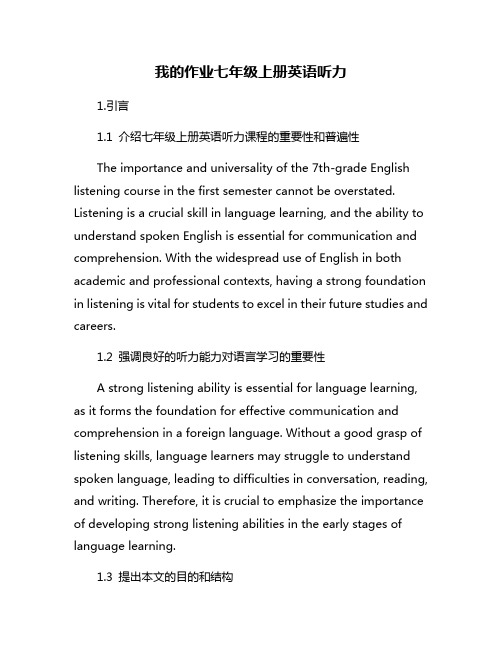
我的作业七年级上册英语听力1.引言1.1 介绍七年级上册英语听力课程的重要性和普遍性The importance and universality of the 7th-grade English listening course in the first semester cannot be overstated. Listening is a crucial skill in language learning, and the ability to understand spoken English is essential for communication and comprehension. With the widespread use of English in both academic and professional contexts, having a strong foundation in listening is vital for students to excel in their future studies and careers.1.2 强调良好的听力能力对语言学习的重要性A strong listening ability is essential for language learning, as it forms the foundation for effective communication and comprehension in a foreign language. Without a good grasp of listening skills, language learners may struggle to understand spoken language, leading to difficulties in conversation, reading, and writing. Therefore, it is crucial to emphasize the importance of developing strong listening abilities in the early stages of language learning.1.3 提出本文的目的和结构In terms of structure, the article will begin with an overview of the seventh grade English listening curriculum, followed by an exploration of the crucial role that listening skills play in language acquisition. We will then delve into various methods and techniques for improving listening skills, drawing on both academic research and practical experience. Subsequently, we will examine common issues that students face in the process of honing their listening abilities, and propose effective solutions to these problems.2.正文2.1 课程内容介绍七年级上册英语听力课程主要包括日常生活用语、基础语法知识、常用单词和短语等内容。
课时优化作业Unit 1What’s in your room听力词汇检测过关 四年级上册英语 教

1.( )2.( )3.( )4.( )5.( )三、听录音三次,写出句子中所缺的单词。
1.Let's_______________a picture.2.There is a big_______________in the room.3.—What colour is it?—It is_______________.4.—What is that?—It is a red_______________.5.I have a new_______________in my bedroom.四、听对话三次,判断下列句子与对话内容是(T)否(F)相符。
( )1.Amy has a new bedroom.( )2.The bedroom is big and nice.( )3.There is a computer in the bedroom.( )4.The walls and the bed are blue in the bedroom. ( )5.There are some flowers between the desk and the bed.词汇过关检测Unit1 What’s in your room?单词:1.地图______________________2.墙________________________3.下一个___________________4.画画_____________________5.卧室,睡房_______________6.花_______________________7.计算机___________________-___8.粉红色(的)_________________9.门____________________________10.在...(两者)之间_______________11.在……旁边___________________12.窗___________________________短语:1.在墙上________________________________________2.在电脑旁边____________________________________3.在两扇窗之间__________________________________4.在门后面______________________________________5.粉红色的花____________________________________6.在床下面_____________________________________句子:1.我想让你们画一下你们的卧室。
人教版七年级英语下册Unit1听力专项训练课件
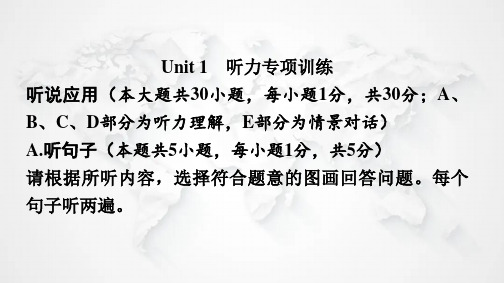
听第四段对话,回答第9小题。 ( A ) 9.How often does Bob play computer games? A.Once a week. B.Twice a week. C.Once a month.
听第四段对话,回答第9小题。 W:How often do you play computer games, Bob? M : I play computer games for two hours every Saturday. What about you? W:Twice a week.
听第三段对话,回答第8小题。 ( C ) 8.What does Jim want to do? A.To do his homework. B.To play the guitar. C.To play ping-pong.
听第三段对话,回答第8小题。 M:Let’s go and play ping⁃pong, Mary. W:Good idea! Jim.
C.听短文(本题共5小题,每小题1分,共5分)
请根据所听内容,从每小题所给的三个选项中选出一
个最佳答案。短文听两遍。
B( ) 16.How many people are there in Bill’s family?
A.Three.
B.Four.
C.Five.
A( ) 17.What can Bill’s father do?
B.听对话(本题共10小题,每小题1分,共10分) 请根据每段对话的内容回答问题,从每小题所给的三个选 项中选出一个最佳答案。每段对话听两遍。 听第一段对话,回答第6小题。 W:What do you usually do on Saturdays and Sundays, Mike? M:I usually have a picnic with my parents and brother in the park.
全新版大学英语视听说教程1学生用书答案

全新版大学英语视听说教程1学生用书答案一、听力部分听力部分包括对话、短文、新闻、电影剪辑等,每段听力材料后都有5个问题,需学生在听完材料后进行回答。
对于学生而言,可以参照答案进行自我检查。
以下为部分答案示例:1、对话部分:问:What’s the main idea of the conversation?答:The man is not sure if he can get the job because there are other applicants who are more experienced.2、短文部分:问:What’s the main idea of the passage?答:The author discusses the importance of reading as a key to success in life and explains how reading can help us learn new skills, understand ourselves and the world better, and enjoy life more.3、新闻部分:问:What’s the main idea of the news?答:The news is about a new law that requires all businesses to provide employees with a minimum number of paid sick days each year.4、电影剪辑部分:问:What’s the main idea of the movie clip?答:The clip is from the movie “The Shawshank Redemption” and it shows how the main character, Andy Dufresne, manages to escape from Shawshank State Prison.二、视说部分视说部分包括角色扮演、英语原版电影片段等,旨在帮助学生提高口语表达能力。
七年级上册英语课堂作业听力2023

七年级上册英语课堂作业听力2023七年级上册英语课堂作业听力2023是指2023年出版的七年级上册英语课堂作业中的听力练习部分。
这些听力练习旨在帮助学生提高英语听力技能,增强对英语语言的理解和掌握。
以下是一个示例七年级上册英语课堂作业听力题目,并附带了相应的听力材料:题目:听对话,选择正确的答案。
听力材料:Woman: Excuse me, do you have any books about history?Man: Yes, we have a few. Do you want to take a look?Woman: Thank you. I'm interested in ancient history.Man: Here is a book about ancient Egypt. It's very interesting.Woman: That sounds good. How much is it?Man: It's $15.Woman: I'll take it. Thank you.Man: You're welcome. Do you need anything else?Woman: No, that's all for now. Thank you.答案:1.Yes, the man has some books about history.2.The woman is interested in modern history.3.The man suggests a book about ancient Egypt.4.The book about ancient Egypt is $10.5.The woman decides to buy the book about ancient Egypt.总结:七年级上册英语课堂作业听力2023是一个听力练习册,旨在帮助学生提高英语听力技能。
义务教育课程标准英语作业本听力
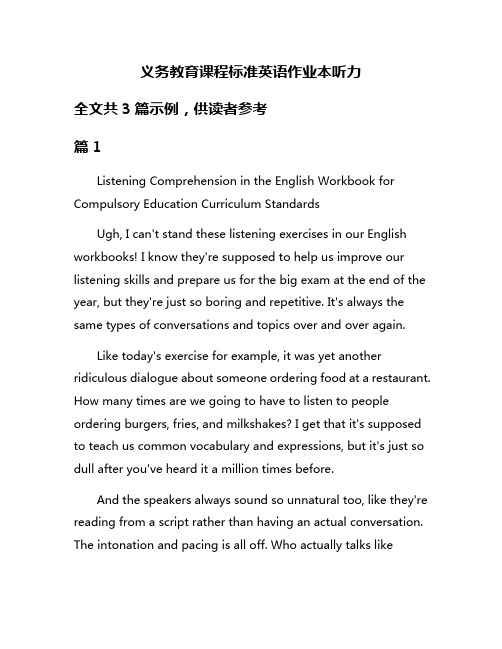
义务教育课程标准英语作业本听力全文共3篇示例,供读者参考篇1Listening Comprehension in the English Workbook for Compulsory Education Curriculum StandardsUgh, I can't stand these listening exercises in our English workbooks! I know they're supposed to help us improve our listening skills and prepare us for the big exam at the end of the year, but they're just so boring and repetitive. It's always the same types of conversations and topics over and over again.Like today's exercise for example, it was yet another ridiculous dialogue about someone ordering food at a restaurant. How many times are we going to have to listen to people ordering burgers, fries, and milkshakes? I get that it's supposed to teach us common vocabulary and expressions, but it's just so dull after you've heard it a million times before.And the speakers always sound so unnatural too, like they're reading from a script rather than having an actual conversation. The intonation and pacing is all off. Who actually talks like"Would. You. Like. Fries. With. That?" No normal human speech pattern sounds so robotic and stilted.At least the multiple choice questions that follow are usually pretty straightforward. As long as you paid even a tiny bit of attention, you can generally figure out things like what the person ordered, how much it cost, whether they wanted to eat there or take it to go, etc. It's basic comprehension stuff that doesn't really push our listening abilities.The worst ones though are when they try to incorporate some cultural aspect about America or another English-speaking country. I inevitably space out during those parts because I just cannot muster up enough interest to care about the history of Thanksgiving dinner or whatever random traditions they're rambling on about.And don't even get me started on the sections where they use different accents like British English or Australian English. I can never understand a single word they're saying! Those accent segments might as well be in a completely foreign language for how utterly confused I get trying to decipher them. My ears just cannot process those dialect variations at all.To be honest, I usually just zone out completely during the entire listening portion and then maniacally fill in the bubblesheets at the end based on some context clues and educated guesses. As long as I get like half of them right, it's still a passing grade. I figure my listening skills will develop through actual immersion and conversations anyway, not from these contrived textbook examples.I know listening comprehension is an important part of learning any new language, but I really wish our curriculum designers would liven things up a bit. Maybe throw in some fun movie clips, excerpts from popular songs, YouTuber dialogue, you know... stuff that actually relates to our lives and interests as modern teenagers. That would make practicing our listening infinitely more engaging.Heck, I'd even prefer if they had us listen to a few minutes of the morning announcements from our own school. At least then it would be accents and situations we're already familiar with. Having to strain to understand these sterile textbook recordings is just not an effective way for me to get better at real-world English listening.I guess the education experts know what they're doing by sticking to these standard dialogues and simplistic prompts. But from a student's perspective, it's just so excruciatingly dull and removed from anything we actually use English for day-to-day.I'll begrudgingly keep slogging through them to pass the class, but I can't see these skills transferring over very well to my ability to comprehend native speakers.Anyway, I've vented enough about the shortcomings of our listening curriculum. I should probably stop procrastinating and actually buckle down to study the next horrible dialogue about ordering takeout or buying groceries or whatever other insipid real-life scenario they've cooked up to torture our poor ears with. The struggle to improve my English listening is real!篇2Compulsory Education Curriculum Standard English Textbook Listening ExercisesAs an English learner in the compulsory education system, the listening exercises in our standard textbooks have been an integral part of my journey to improving my English proficiency. These exercises, while often overlooked or underappreciated, have played a crucial role in developing my listening comprehension skills and exposing me to a wide range of accents, vocabularies, and real-life scenarios.From the very beginning of our English education, the listening exercises were seamlessly integrated into our textbooks.They started with simple dialogues and monologues, featuring familiar topics such as greetings, introductions, and descriptions of everyday objects and activities. These exercises were designed to ease us into the world of English listening, allowing us to familiarize ourselves with the rhythm, intonation, and basic vocabulary of the language.As we progressed through the grades, the listening exercises gradually increased in complexity, mirroring our growing linguistic abilities. We encountered more elaborate dialogues, narratives, and even short lectures on various subjects. These exercises exposed us to a diverse range of accents, from the standard British and American accents to regional variations and non-native speaker accents. This exposure was invaluable, as it prepared us for the real-world communication scenarios we would eventually encounter.One aspect of the listening exercises that I particularly appreciated was the inclusion of cultural references and context. These exercises not only tested our listening comprehension but also provided insights into the customs, traditions, and ways of life of English-speaking communities around the world. Through these exercises, we learned about holidays, festivals, and socialnorms, broadening our understanding of the language beyond just vocabulary and grammar.The listening exercises also played a crucial role in developing our note-taking skills. As we listened to longer passages, we were encouraged to jot down key points, main ideas, and important details. This practice not only improved our ability to identify and extract relevant information but also prepared us for the academic listening tasks we would encounter in higher education and professional settings.However, the listening exercises were not without their challenges. At times, the audio quality or the speed of the speakers posed difficulties, forcing us to sharpen our focus and develop strategies for overcoming these obstacles. We learned to listen actively, to pause and replay sections when needed, and to use contextual clues to fill in any gaps in our understanding.Despite these challenges, the listening exercises in our standard English textbooks fostered a sense of confidence and competence within us. As we progressed through the exercises, we could tangibly feel our comprehension improving, and our ability to understand spoken English in various contexts grew stronger. This confidence translated into increased participation in classroom discussions and a willingness to engage inconversations with English speakers outside the classroom setting.Looking back, the listening exercises in our compulsory education curriculum were more than just a series of tasks to complete. They were a gateway to a world of diverse accents, cultures, and perspectives. They trained our ears to pick up on nuances and subtleties, and they equipped us with the skills necessary to navigate the ever-increasing presence of English in our globalized world.As I prepare to embark on the next phase of my educational or professional journey, I carry with me the invaluable lessons learned from these listening exercises. They have instilled in me a deep appreciation for the complexities of language and a curiosity to continue exploring the richness of the English language through authentic listening experiences. The compulsory education curriculum may have provided the foundation, but the journey of lifelong learning in English listening has only just begun.篇3Compulsory Education Curriculum Standard English Homework ListeningWell, here we go again with another one of those tedious listening homework assignments for English class. I swear, Ms. Johnson must get some sort of sick pleasure out of torturing us with these every week. Doesn't she realize how mind-numbingly boring they are? I mean, I get that listening comprehension is important and all for learning English, but these canned listening exercises are just the worst.The format is always the same. We have to listen to some inane dialogue or passage about completely uninteresting topics like the weather, shopping, or describing someone's daily routine. Yeah, because those are totally realistic situations a bunch of American teenagers are going to encounter and care about. Not!Then we have to answer those ridiculous comprehension questions that test our ability to pick up on random details that nobody actually pays attention to when having a real conversation. Like, "What color was the woman's shirt in the conversation?" Or, "How many times did the speaker say the word 'and'?" Who really listens for that kind of trivial nonsense?And don't even get me started on the accents and speech patterns they use in these audio clips. The speakers always sound like oveformciated robots or stuck-up Brits from the 1940s.Nobody talks like that in real life anymore, at least not in the U.S. Can't they find some more natural, contemporary audio samples to use instead?The whole exercise just feels so detached from any actual practical language learning. When am I ever going to need to obsessively analyze the most mundane and dry aspects of people's speech? These homework assignments would be way more effective if they used engaging conversations on topics my friends and I could relate to.Imagine how much more motivating it would be to listen to some authentic dialogue between American teenagers talking about video games, music, movies, social media, or the other stuff we actually care about. Or what about listening to excerpts from TV shows, YouTube videos, or podcasts we enjoy? That would make practicing our listening skills way more interesting and useful.Instead, we're stuck straining to catch boring details from these lame pre-scripted conversations about the Johnsons going grocery shopping or Mr. Thompson's morning routine before work. I start zoning out literally 10 seconds into each audio clip because the content is so dry and irrelevant to my life. No highschool student is going to perk up their ears for that. At least use some drama or humor to grab our attention!Then there's the matter of the audio quality itself on these homework CDs or website tracks we have to listen to. It's never just a straightforward, clear recording. There always has to be some distracting background noise, weird echoes, or conveniently muddled words to make it even harder to comprehend. I'm sure that's on purpose to increase the "difficulty level" and make it more "realistic." But does it really have to be that aggravating?In real conversations, you can ask the person to repeat themselves or clarify something you missed. But with these homework exercises, we have to keep rewinding and re-listening to the same 30 second clip over and over, straining to catch the one garbled word or phrase we need to answer a question. I waste so much time just trying to make out the dialogue, rather than working on actually understanding it from a comprehension standpoint. It's unnecessarily frustrating!Don't even get me started on the antiquated technology we have to use, like ancient CD-ROM discs from the 90s or those trash education company websites with terrible audio players. Why can't we just use normal podcasts, YouTube, musicstreaming sites, or really any other modern audio platform we're familiar with? Forcing us to use those relic audio formats just creates another annoying layer of technological frustration between us and the content.I have a million other English assignments to work on, but I always find myself dreading and procrastinating on these listening homework worksheets because they're so painful to get through. I usually just bear down and blast through them at the last minute, not even paying full attention because the content is so mindlessly boring. I'll skim the questions, play each clip once, jot down whatever faint details I can half-perceive, and then just guess on any questions I can't answer based on my sloppy notes. Close enough for government work, right?Ms. Johnson will never know whether I legitimately comprehended those lame conversations or not, because all that matters for getting halfway decent marks is just giving the appearance of effort. I'm sure I'm not the only student who tunes out these homework assignments while still managing to pass that section of the class. Does anyone actually get value out of spending time on these outdated, inauthentic listening exercises? Or am I just venting the shared frustrations of every Englishlanguage learner assigned busywork from antiquated textbook companies?If these homework assignments were actually engaging, relevant, utilized modern audio technology, and helped prepare us for real-world listening scenarios...maybe I'd be more enthusiastic about doing them. But as they are now, they're just a tedious chore I have to muscle through while struggling to stay awake. Snoozefest. I don't know how much longer I can keep forcing myself to do the bare minimum effort on these before I completely check out and give up. Let's just hope I don't bomb that section of the exam, or Ms. Johnson will really let me have it. What a nightmare that would be.。
含听力三年级英语上册Recycle 1第一课时课课练及答案
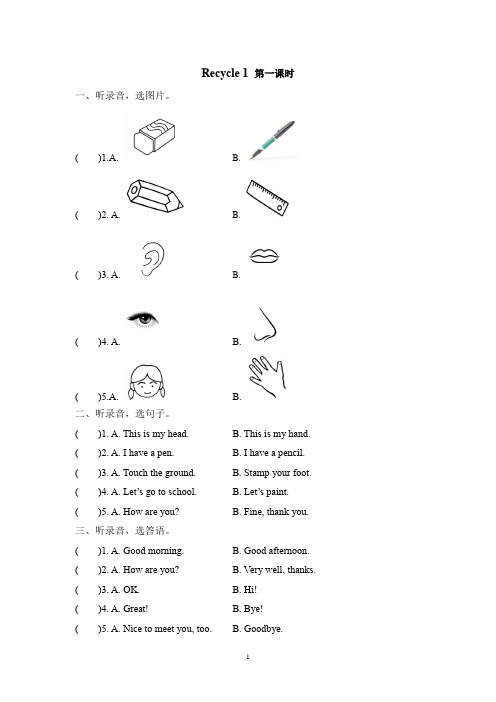
Recycle 1 第一课时一、听录音,选图片。
()1.A. B.()2. A. B.()3. A. B.()4. A. B.()5.A. B.二、听录音,选句子。
()1. A. This is my head. B. This is my hand. ()2. A. I have a pen. B. I have a pencil. ()3. A. Touch the ground. B. Stamp your foot. ()4. A. Let’s go to school. B. Let’s paint.()5. A. How are you? B. Fine, thank you.三、听录音,选答语。
()1. A. Good morning. B. Good afternoon. ()2. A. How are you? B. Very well, thanks. ()3. A. OK. B. Hi!()4. A. Great! B. Bye!()5. A. Nice to meet you, too. B. Goodbye.()5. Let’s go to school. E. 让我看看你的铅笔盒。
六、找一找,在发音相同的单词前的括号里写T,不同的写F。
( ) 1.pen leg( ) 2.cat apple( ) 3.he desk( ) 4.six milk( ) 5.big kite七、连词成句,规范书写。
1. shake, body, your (.)2. is, my, nose, this (.)3. your, touch, head (.)答案一、1.A 2.A 3.B 4.B 5.A二、1.A 2.B 3.B 4.A 5.A三、1.B 2.B 3.A 4.B 5.A四、What’s your name ? —My name is John.How are you? —I’m fine, thank you.Let’s go to school. —OK.Nice to meet you. —Nice to meet you, too.Good afternoon. —Good afternoon.五、1.B 2.E 3.D 4.A 5.C六、1.T 2.T 3.F 4.T 5.F七、1. Shake your body. 2. This is my nose. 3. Touch your head.听力材料一、听录音,选图片。
第三版《大学英语 》1 一课一练 Unit 1 - 答案和听力材料
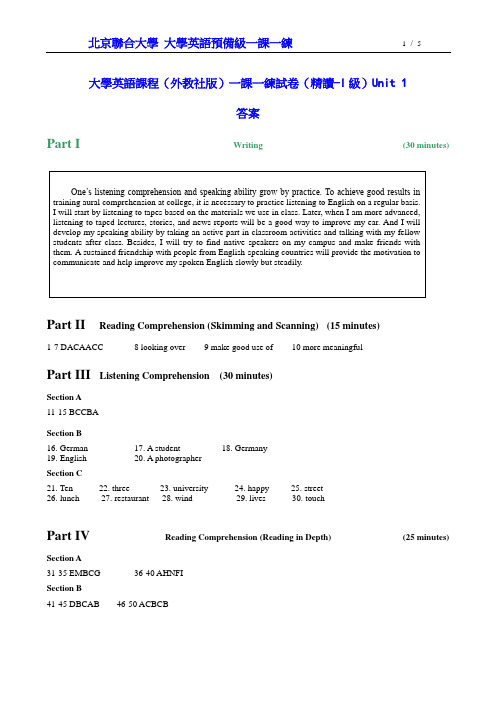
大學英語課程(外教社版)一課一練試卷(精讀-I級)Unit 1答案Part I Writing (30 minutes)Part II Reading Comprehension (Skimming and Scanning) (15 minutes)1-7 DACAACC 8 looking over 9 make good use of 10 more meaningfulPart III Listening Comprehension (30 minutes)Section A11-15 BCCBASection B16. German 17. A student 18. Germany19. English 20. A photographerSection C21. Ten 22. three 23. university 24. happy 25. street26. lunch 27. restaurant 28. wind 29. lives 30. touchPart IV Reading Comprehension (Reading in Depth) (25 minutes) Section A31-35 EMBCG 36-40 AHNFISection B41-45 DBCAB 46-50 ACBCBPart V Cloze (15 minutes) 51-55 DCBAD 56-60 ACBCD 61-65 AADBC 66-70 BABDCPart VI Translation (5 minutes)71. impossible to communicate with her 16-year-old daughter72. In addition to / Apart from writing compositions on a weekly basis73. a native English speaker is going to teach us spoken English next term / semester74. but will also help you build your speaking skills75. please feel free to ask meTypescriptsSection AConversation 1Hey, This Is My TableW Hey!M Yeah?W This is my table.M Your table?W Yeah. This is my bag. I left it on the table.Didn’t you see it?M Yeah, I guess so.W Well?M Well, sorry, but the place’s really busy.There were no other tables, so… Do You mind?W Well, I guess you can stay.M Thanks. By the way, my name’s Bradley.But you can call me Bard.W I’m Monica. My friends call me Nicki.M You know, I’ve seen you somewhere.W Oh?M I know! You’re a friend of EmiW Yeah, she’s my best friend.M I met you at Emi’s house once.W Oh, now I remember you.M So we do know each other… Nicki.W Ok, I guess we do… Brad.Conversation TwoMaggie Meets an Old FriendLaura Maggie? Maggie?Maggie Laura? Is that you?Laura Yeah. What a surprise!Maggie It’s been a long time.Laura I know. It’s been. What? Five years?Maggie Five years. Oh my gosh. I can’t believe it.Laura I know. It’s incredible. So… what’s happening with you?Maggie Well, I just got a job at a publishing company.Laura Great. What do you do?Maggie I’m an assistant editor. I’m working on three book projects. It’ so great.Laura Wow, Sounds busy.Maggie Yeah. Can you remember me in high school? I didn’t like to be busy, just liked to have a lot of free time, and be with my friends. But now I sort of like being busy,Laura Wow, that’s a change. So are you shopping? Spending a lot of money?Maggie No, I’ just looking around. I don’t spend a lot of money on clothes.Laura I know what you mean. I don’t either. I am so glad to see you again, Maggie. Well, Take care, Maggie. Maggie Uh, wait. I’m just about to have lunch. Want to come along?Laura Sure, That’d be great.Section BWindy, Isn’t it?George Windy, isn’t it?Diana Yes, it is.George By the way, my name’s George.Diana Hello. I’m Diana.George Hi, Diana. Uuh … where are you going?Diana To Germany. I’m going home.George oh, you’re German.Diana Yes. You’re English, aren’t you?George Yes, I am.Diana Where are you going?George To Portugal.Diana On holiday?George No, I’m going to take some photographs there.Diana Take photographs?George Yes, I work for a travel magazine in Italy.Diana Ah.George What do you do?Diana I’m a student.George What are you studying?Diana Medicine.George Oh, my brother is a doctor.Diana Really?George It’s rather cold out here on the deck. Would you like a coffee?Diana Yes, I’d love one.George Let’s go along to the restaurant the.Section COld Friends MeetMichael was walking along the street the other day. Suddenly he heard someone shouting his name. He stopped and looked around. A young man was running after him. It was Jack Evans. Ten years ago Michael and Jack went to the same high school and then they studied at the same university. But they hadn’t met each other since their graduation three years ago. They were very happy to see each other again and decided to have lunch together. Sothey went to the nearest restaurant and sat at a table by the window. They had told each other stories about their lives and promised to keep in touch in the future.。
九下英语课堂作业听力
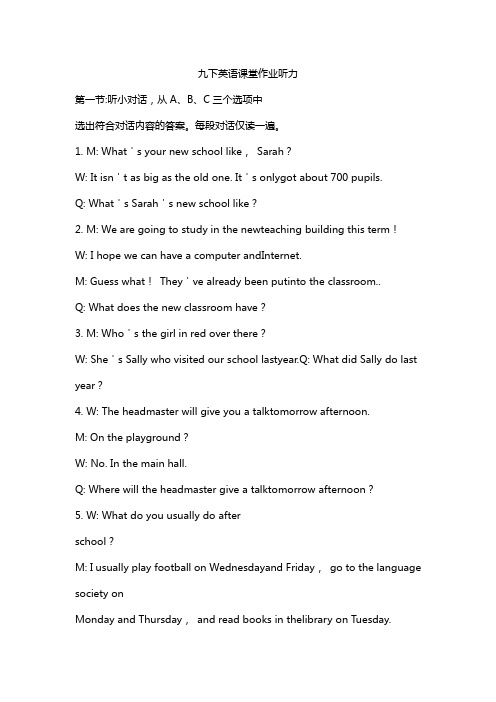
九下英语课堂作业听力第一节:听小对话,从A、B、C三个选项中选出符合对话内容的答案。
每段对话仅读一遍。
1. M: What's your new school like,Sarah?W: It isn't as big as the old one. It's onlygot about 700 pupils.Q: What's Sarah's new school like?2. M: We are going to study in the newteaching building this term!W: I hope we can have a computer andInternet.M: Guess what!They've already been putinto the classroom..Q: What does the new classroom have?3. M: Who's the girl in red over there?W: She's Sally who visited our school lastyear.Q: What did Sally do last year?4. W: The headmaster will give you a talktomorrow afternoon.M: On the playground?W: No. In the main hall.Q: Where will the headmaster give a talktomorrow afternoon?5. W: What do you usually do afterschool?M: I usually play football on Wednesdayand Friday,go to the language society onMonday and Thursday,and read books in thelibrary on Tuesday.W: You look so busy!Q: Where does the boy usually go onMonday and Thursday?第二节:听长对话,回答问题。
- 1、下载文档前请自行甄别文档内容的完整性,平台不提供额外的编辑、内容补充、找答案等附加服务。
- 2、"仅部分预览"的文档,不可在线预览部分如存在完整性等问题,可反馈申请退款(可完整预览的文档不适用该条件!)。
- 3、如文档侵犯您的权益,请联系客服反馈,我们会尽快为您处理(人工客服工作时间:9:00-18:30)。
试题 1
Part I Listening Comprehension (20 minutes)
Section A
1. (A) The pear. (C) The sea food.
(B) The weather. (D) The cold.
2. (A) Mary has never studied mathematics. (C) Mary enjoys learning mathematics.
(B) Mary must be good at mathematics. (D) Mary probably is poor at mathematics.
3. (A) George's brother. (C) George's father.
(B) George's wife. (D) George's father-in-law.
4. (A) She can use his car. (C) She must get her car fixed.
(B) She can borro w someone else's car. (D) She can't borrow his car.
5. (A) At 2:35. (C) At 3:00.
(B) At 2:45. (D) At 3:15.
6. (A) To the bank. (C) To a shoe store.
(B) To bookstore. (D) To the grocer's.
7. (A) Near the station (C) In the city.
(B) In the co u ntry (D) Near her work place
8. (A) At a cigarette store (C) At a gas station
(B) At a bus station (D) At Aunt Mary's
9. (A) Form upstairs (C) Form the Nelsons' house.
(B) Form next door. (D) Form the back door.
10. (A) The choice of course. (C) An evening course.
(B) A day course. (D) Their work.
Section B
Passage One
Questions 11 to 14 are based on the following passage you have just heard.
11. (A) They haven't reached a decision yet. (C) They want to go hunting camping.
(B) Th e y have decided to go hunting bears. (D) They want to go exploring the country.
12. (A) Susie. (C) The speaker.
(B) Tom. (D) The speaker's husband.
12. (A) They chased the bear away.
(B) They stayed outside the tent and did nothing.
(C) They cl imbed up a tree.
(D) They put some honey outside for the bear to eat.
14. (A) He ate the honey. (C) He chased the people away.
(B) He drank the beer. (D) He turned things upside down.
Passage Two
Questions 15 to 17 are based on the passage you h a ve just heard.
15. (A) He missed the appointment. (C) He was sick.
(B) He arrived late. (D) He was very busy.
16. (A) He was busy sightseeing. (C) He didn't want to see Mr. Jordan any more.
(B) He couldn't reach Mr. Jordan's office. (D) He didn't want to take the trouble making it.
17. (A) The trip didn't do any good to his health.
(B) The trip was a complete disappointment.
(C) The trip was enjoyable but not fruitful in terms of business.
(D) The trip made it possible for him to meet many interesting people.
Passage Three
Questions 18 to 20 are based on the passage you have just heard.
18. (A) He lost consciousness. (C) He was seriously injured.
(B) He was slightly wounded. (D) He was buried under an icebox.
19. (A) About f our days. (C) A day and a half.
(B) Around eight days. (D) More than six days.
20. (A) His father pulled him out in time. (C) He stayed in an icebox.
(B) He left the area before the earthquake. (D) Their house escaped the earth q uake.。
